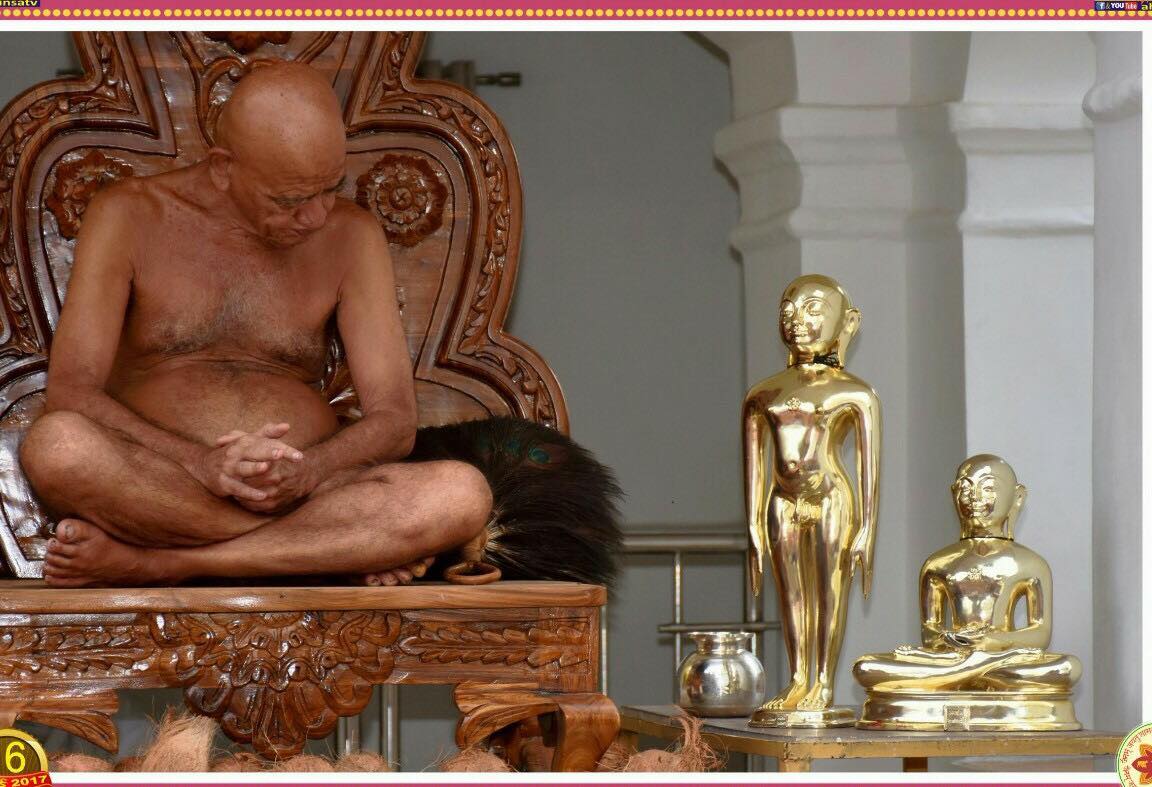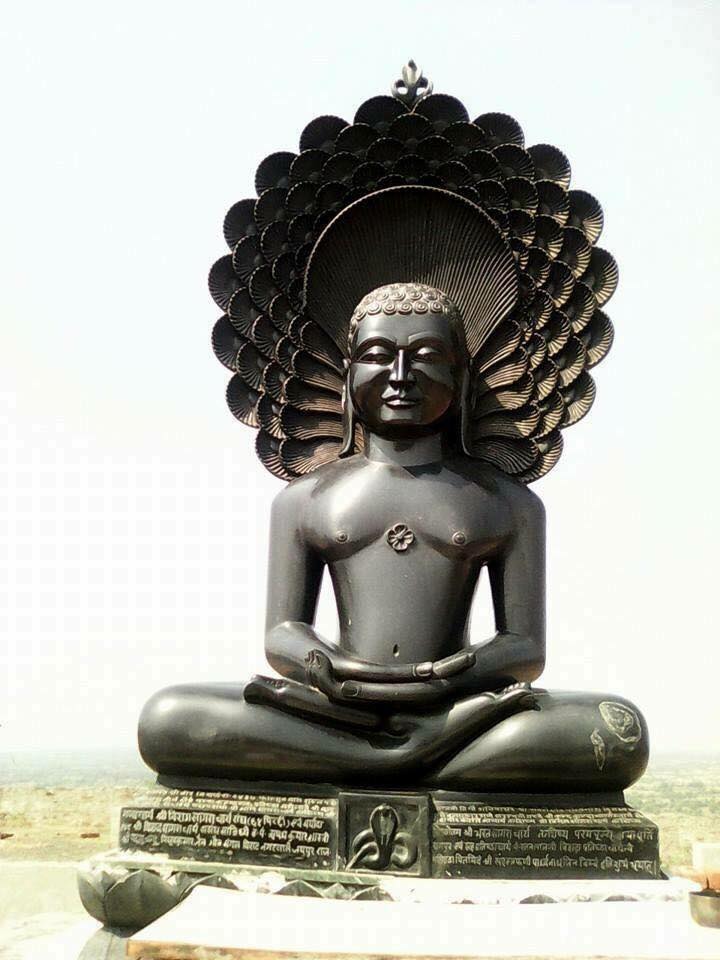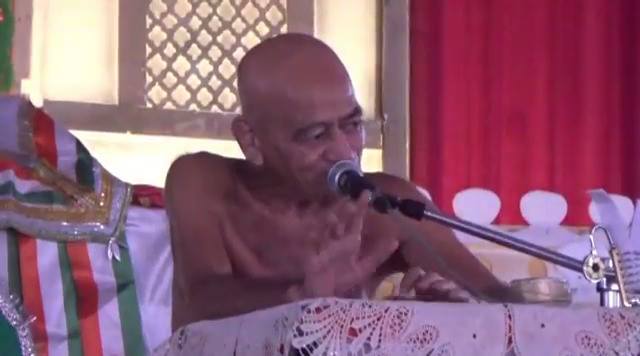Update
#मैं_बूढ़ा_नहीं_हुआ_हूँ -आचार्य विद्यासागर जी #AcharyaVidyasagar
नेमावर जी से करीब 7 माह बाद बिहार हुआ। सभी सोच रहे थे कि हरदा जाएंगे। लेकिन आचार्य श्री ने को किसी ने बताया कि नहर वाले कच्चे रास्ते से सीधे भादू गांव जा सकते हैं, परन्तु हरदा छूट जाएगा। आचार्य श्री ने उस कच्चे रास्ते से ही बिहार कर दिया। मैं (एलक प्रज्ञासागर) एवं छूल्लक चंद्र सागर, एलक निर्भय सागर और 1-2 महाराज साथ थे। पगडंडी थी, तो मैं और एलक श्री निर्भयसागर जी दोनों तेज गति से आचार्य श्री के आगे आगे चल रहे थे। आचार्य श्री हम लोगों के पीछे तेजी से आ रहे थे। पर थोड़ी देर में हम लोगों के पास आकर बोले- *"क्यों हमें बूढ़ा समझ रखा है क्या?" हम लोगों हँस दिए। तभी आचार्य श्री ने हम लोगों को हँसी के तौर पर छेड़ा,और बोले- *"भैया! जवानों के साथ हमें भी जवान होना पड़ता है।" हम सभी उनके साथ हंसने लगे।*
मैंने आचार्य श्री से बोला- *"आप अभी बूढ़े थोड़ी हुए हैं, आप अभी तो जवान हैं।" आचार्य श्री बोले- *"यह बात अलग है, पर आप लोगों जैसे जवान तो नहीं हूँ।" हमने कहा- *"आचार्य श्री जवानों के साथ जो रहता है, वह कभी बूढ़ा नहीं होता। शरीर से बूढ़ा होना बुरा नहीं माना जाता, मन से बूढ़ा होना ही बूढ़ापन माना जाता है। आप तो मन से सदा जवान रहते हैं।" आचार्य श्री हंसने लगे और बोले- *"हाँ, चलो मेरे जवानों। सभी ने एक स्वर में हँस दिया, और कदमों को तेज गति दी। शाम होने के पूर्व गंतव्य स्थान पर पहुंच गए।_
🎧 e-Storehouse • www.jinvaani.org 📚 Have Rational Insight/Knowledge...
 Source: © Facebook
Source: © Facebook
Update
Video

पहले अंगूठा लगाकर सब काम होते थे Signature नहीं चलते थे.. जिसको अंगूठा-छाप कहा जाता था.. फिर Signature का समय आया अब फिर अंगूठा का समय आगया हैं [ Finger ID ] signature copy किया जा सकता हैं.. अंगूठा छाप कॉपी नहीं किया जा सकता हैं... यह original & natural हैं:) #watch & #share #AcharyaVidyasagar
🎧 e-Storehouse • www.jinvaani.org 📚 Have Rational Insight/Knowledge..
Jainism and Peace 🙂
Peace to all living beings is the credo of Jainism and therefore this article would remain incomplete if we do not mention the Jain concept of peace. According to Jainism, peace is a fundamental quality of the soul, essential for attaining infinite¸Ananda. Eternal peace is the primary state as well as the ultimate goal of soul. Peace is an internal aspect of mind as well as external aspect of the individual, family, society, nation, the world and indeed the whole universe; The internal peace of mind and external peace in the world are two different things; in the absolute sense, they are independent of each other but in practice they are inter-related as well. One can attain internal peace even when the external conditions are adverse and persons may appear externally peaceful even though internal peace eludes them. The Jain concept of peace is different from most other philosophies.
The basic Jain approach to Peace is the welfare (mangala) of all living beings, from smallest insects to the most evolved mammals. There are many aspects of peace in Jainism. Some of them are as folllowing:
1. Peace (Shanti) is an eternal quality of the soul. One can attain eternal peace by conquering one self, making one free of all the vices (anger, jealousy, competition, attachment, hatred etc) which are then automatically eliminated. When one is peaceful with himself then the family becomes peaceful, then the society, then the nation, then the world and then the whole universe.
2. Welfare of self depends on the welfare of others; hence the principle of nonviolence. Welfare of all living creatures constitute the main thrust of Jain prayers.
3. Peace entails respecting views of others even if they are contradictory; hence the principle of Anekantavada, discussed in post no. #5.
4. Peace cannot be attained without sacrifice on part of the self. Hence the principles of Tapa, living frugally, Aparigraha and Steya etc.
Peace in some other thoughts, particularly in the western approach, implies safe conditions for one self without much concern about the safety of others. In contrast, Jainism believes that safe conditions for one self are only ensured when it is safe for everyone else in the world; hence there is more emphasis on the safety of others rather than oneself.
When one conquers one’s own self, one attains internal peace but for external peace conquering the world is not essential. The Jainism has the same approach to peace: one need not be a super power with powerful weapons at its disposal to rule the earth. The real super power status is attained, not at the point of gun, but when others willingly share and follow your thought and philosophy.
Non-violence and forgiveness are the prime requirements for peace. Non violence should be practiced to the extent that you do not hurt any creatures in thought, words and deed and you seek forgiveness in case someone is hurt, knowingly or unknowingly. Most people in the world do not like violence and in this respect they follow Jainism to some extent. Jainism does not permit any form of violence in thought, action or consent and even support of violence for any reason whatsoever even at the cost of the physical safety of oneself or in self defence. Non violence must start at the lowest level of living species and should not be confined only to humans. Vegetarianism is thus basic to Jainism. There is detailed procedure for seeking forgiveness. The Jains have earmarked a day every year, called the universal day of forgiveness, for seeking forgiveness. This certainly brings peace and harmony in the family and society. It is hoped that the Jain practices will lead to a peaceful world and bring welfare to one and all.
(Article written by Professor Narendra Bhandari)
--- www.jinvaani.org @ Jainism' e-Storehouse ---
#Jainism #Jain #Digambara #Nirgrantha #Tirthankara #Adinatha #MahavirBhagwan #Rishabhdev #AcharyaVidyasagar #LordMahavira #Ahinsa #Nonviolence
 Source: © Facebook
Source: © Facebook
Update
Video
 Source: © Facebook
Source: © Facebook
पहले अंगूठा लगाकर सब काम होते थे Signature नहीं चलते थे.. जिसको अंगूठा-छाप कहा जाता था.. फिर Signature का समय आया अब फिर अंगूठा का समय आगया हैं [ Finger ID ] signature copy किया जा सकता हैं.. अंगूठा छाप कॉपी नहीं किया जा सकता हैं... यह original & natural हैं:) #watch & #share #AcharyaVidyasagar
🎧 e-Storehouse • www.jinvaani.org 📚 Have Rational Insight/Knowledge..
Jainism and Peace 🙂
Peace to all living beings is the credo of Jainism and therefore this article would remain incomplete if we do not mention the Jain concept of peace. According to Jainism, peace is a fundamental quality of the soul, essential for attaining infinite¸Ananda. Eternal peace is the primary state as well as the ultimate goal of soul. Peace is an internal aspect of mind as well as external aspect of the individual, family, society, nation, the world and indeed the whole universe; The internal peace of mind and external peace in the world are two different things; in the absolute sense, they are independent of each other but in practice they are inter-related as well. One can attain internal peace even when the external conditions are adverse and persons may appear externally peaceful even though internal peace eludes them. The Jain concept of peace is different from most other philosophies.
The basic Jain approach to Peace is the welfare (mangala) of all living beings, from smallest insects to the most evolved mammals. There are many aspects of peace in Jainism. Some of them are as folllowing:
1. Peace (Shanti) is an eternal quality of the soul. One can attain eternal peace by conquering one self, making one free of all the vices (anger, jealousy, competition, attachment, hatred etc) which are then automatically eliminated. When one is peaceful with himself then the family becomes peaceful, then the society, then the nation, then the world and then the whole universe.
2. Welfare of self depends on the welfare of others; hence the principle of nonviolence. Welfare of all living creatures constitute the main thrust of Jain prayers.
3. Peace entails respecting views of others even if they are contradictory; hence the principle of Anekantavada, discussed in post no. #5.
4. Peace cannot be attained without sacrifice on part of the self. Hence the principles of Tapa, living frugally, Aparigraha and Steya etc.
Peace in some other thoughts, particularly in the western approach, implies safe conditions for one self without much concern about the safety of others. In contrast, Jainism believes that safe conditions for one self are only ensured when it is safe for everyone else in the world; hence there is more emphasis on the safety of others rather than oneself.
When one conquers one’s own self, one attains internal peace but for external peace conquering the world is not essential. The Jainism has the same approach to peace: one need not be a super power with powerful weapons at its disposal to rule the earth. The real super power status is attained, not at the point of gun, but when others willingly share and follow your thought and philosophy.
Non-violence and forgiveness are the prime requirements for peace. Non violence should be practiced to the extent that you do not hurt any creatures in thought, words and deed and you seek forgiveness in case someone is hurt, knowingly or unknowingly. Most people in the world do not like violence and in this respect they follow Jainism to some extent. Jainism does not permit any form of violence in thought, action or consent and even support of violence for any reason whatsoever even at the cost of the physical safety of oneself or in self defence. Non violence must start at the lowest level of living species and should not be confined only to humans. Vegetarianism is thus basic to Jainism. There is detailed procedure for seeking forgiveness. The Jains have earmarked a day every year, called the universal day of forgiveness, for seeking forgiveness. This certainly brings peace and harmony in the family and society. It is hoped that the Jain practices will lead to a peaceful world and bring welfare to one and all.
(Article written by Professor Narendra Bhandari)
--- www.jinvaani.org @ Jainism' e-Storehouse ---
#Jainism #Jain #Digambara #Nirgrantha #Tirthankara #Adinatha #MahavirBhagwan #Rishabhdev #AcharyaVidyasagar #LordMahavira #Ahinsa #Nonviolence
 Source: © Facebook
Source: © Facebook
News in Hindi
उपदेश के बिना भी विद्या प्राप्त हो सकती है। जिस राह नहीं चलते वहां रास्ता नहीं यह धारणा नहीं बनाना चाहिए। कुछ लोग होते हैं जो रास्ता बनाते जाते हैं महापुरूष आगे चलते जाते हैं और रास्ता बनता जाता है। --पूज्य आचार्यश्री विद्यासागर महाराज #AcharyaVidyasagar
आचार्यश्री ने अपने मंगल प्रवचनों में आगे कहा कि समवशरण में सब कुछ प्राप्त हो जाता है। लेकिन सम्यग्दर्शन मिले जरूरी नहीं। बाहरी कारण मिलने के साथ भीतरी कारण मिले यह नियम नहीं होता। अंतरंग निमित्त बहुत महत्वपूर्ण होता है। चक्रवर्ती भरत के 923 बालक जिन्होंने कभी नहीं बोला वे दादा तीर्थंकर से 8 वर्ष पूर्ण होने के बाद कहते हैं कि हमें भगवन हमें दीक्षा प्रदान करें। साक्षात तीर्थंकर भगवान का निमित्त पाकर बिना उपदेश सुने ही स्वयं दीक्षित हो जाते हैं। यह समवशरण का अतिशय है। वे दीक्षा धारण कर सीधे जंगल चले जाते हैं। उपदेश के बिना समग्यदर्शन भी संभव है। जानकर भी शास्त्र का श्रद्धान नहीं करना शास्त्र का अवर्णवाद है। मोक्ष मार्ग का निरूपरण करते समय स्वयं को संयत कर लेना चाहिए, वरना स्वयं के साथ-साथ मोक्ष मार्ग का भी बिगाड़ हो जाता है। कषाय के रूप अनेक प्रकार के होते हैं। जिस तरह सूर्य चंद्रमा और दीपक से अलग अलग रोशनी मिलती है। मुझे मोक्ष मार्ग मिला है तो दूसरों को भी प्राप्त हो जाए, ऐसा बात्सल्य भाव ज्ञानी को होता है। जिस तरह गाय अपने बछड़े के प्रति वात्सल्य भाव रखती है। जो केवल ज्ञान का विषय होता है वह उसे मति ज्ञान और श्रुत ज्ञान का विषय नहीं बना सकते ।
🎧 e-Storehouse • www.jinvaani.org 📚 Have Rational Insight/Knowledge...
 Source: © Facebook
Source: © Facebook
